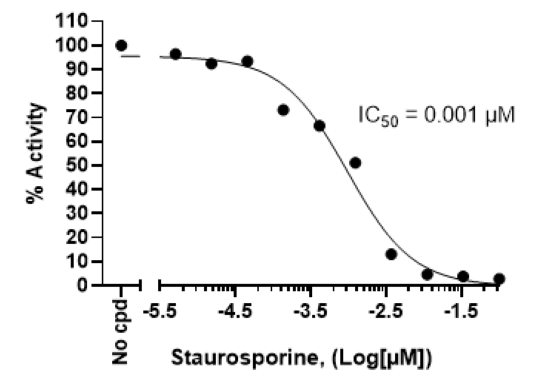Chemi-Verse™ TNK1 Kinase Assay Kit
The Chemi-Verse™ TNK1 Kinase Assay Kit is designed to measure TNK1 (tyrosine kinase non receptor 1) tyrosine kinase activity for screening and profiling applications using ADP-Glo™ as a detection reagent. The assay kit comes in a convenient 96-well format, with enough purified recombinant TNK1 kinase (amino acids 106-390), kinase substrate, ATP, and kinase assay buffer for 100 enzyme reactions.
- ADP-Glo™ Kinase Assay (Promega #V6930)
- DTT (Dithiothreitol), 1M, optional
- Microplate reader capable of reading luminescence
- Adjustable micropipettor and sterile tips
- 30°C incubator
TNK1, also known as tyrosine kinase non receptor 1 or thirty-eight-negative kinase -1, is part of the NRTK family (non-receptor tyrosine kinases), in particular the ACK sub-family. This sub-family is composed of two members, TNK1 and TNK2, and they are unique in that they have a putative ubiquitin association domain (UBA). TNK1 has a tissue-restricted expression profile in adults, being present in prostate, testis, ovaries, colon, and the small intestine. During development it is more widely expressed, and it is involved in hematopoiesis. TNK1 is involved in the primary lymphoid malignancies by mediating cell survival, and it has been shown to sensitize cancer cells to stress by reducing phosphorylation of STAT3 (signal transducer and activator of transcription 3) and STAT5 in L540 cells. TNK1 is inhibited by interacting with the protein 14-3-3, a binding that involves MARK (MAP/microtubule affinity-regulating kinase)-mediated phosphorylation. Regulation of its activity also involves ubiquitin. When active, TNK1 can induce growth-factor independent lymphoid cell proliferation in vitro. The use of an inhibitor, TP-5801, has shown efficacy in suppressing tumor growth in vitro and in vivo. The deeper understanding of the mode of action of this unique kinase and of the effects of its inhibition may open new therapeutic avenues.
Chan T., et al., 2021 Nature Communications 12: 5337.


